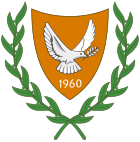
Back نزاع قبرص Arabic Kipr böhranı Azerbaijani Conflicte de Xipre Catalan Kyperský spor Czech Delingen af Cypern Danish Zypernkonflikt German Κυπριακό (ζήτημα) Greek Konflikto de Kipro Esperanto Cuestión de Chipre Spanish Zipreko gatazka Basque
This article includes a list of general references, but it lacks sufficient corresponding inline citations. (March 2009) |
| Cyprus problem | ||||||||
|---|---|---|---|---|---|---|---|---|
 Flag map showing the current division, with territory controlled by the internationally-recognised Cyprus and the Turkish Republic of Northern Cyprus separated by the UN buffer zone. UK bases are also depicted. | ||||||||
| ||||||||
| Belligerents | ||||||||
|
Supported by: (with International community recognition) |
Supported by: |
Supported by: | ||||||
 |
|---|
The Cyprus problem, also known as the Cyprus conflict, Cyprus issue, Cyprus dispute, or Cyprus question, is an ongoing dispute between the Greek Cypriot and the Turkish Cypriot community in the north of the island, where troops of the Republic of Turkey are deployed. This dispute is an example of a protracted social conflict. The Cyprus dispute stems from a Turkish military invasion of the island after a coup, and the presence of Turkish soldiers despite a legal reinstatement of a stable government. The desire of some of the ethnic Turkish peoples for the partition of the island of Cyprus through Taksim, and mainland Turkish nationalists settling in as a show of force as a supposed means of protecting their people from what they considered to be the threat of Greek Cypriots, also plays a role in the dispute.
Initially, with the occupation of the island by the British Empire from the Ottoman Empire in 1878 and subsequent annexation in 1914, the "Cyprus dispute" referred to general conflicts between Greek and Turkish islanders.[1][2]
However, the current international complications of the dispute stretch beyond the boundaries of the island itself and involve the guarantor powers under the Zürich and London Agreement (namely Greece and Turkey and the United Kingdom), the United Nations, and now the European Union as well. The now-defunct Czechoslovakia and Eastern Bloc had previously also interfered politically.[3]
The problem entered its current phase in the aftermath of the 1974 Turkish invasion of Cyprus, occupying the northern third of Cyprus. Although the invasion was triggered by the 1974 Cypriot coup d'état, Turkish forces refused to depart after the legitimate government was restored. The Turkish Cypriot leadership later declared independence as the Turkish Republic of Northern Cyprus, although only Turkey has considered the move legal, and there continues to be broad international opposition to Northern Cyprus independence. According to the European Court of Human Rights, the Turkish Republic of Northern Cyprus should be considered a puppet state under effective Turkish occupation, and legitimately belongs to Cyprus.[4][5][6] The United Nations Security Council Resolution 550 of 1984 calls for members of the United Nations to not recognize the Turkish Republic of Northern Cyprus.
As a result of the two communities and the guarantor countries committing themselves to finding a peaceful solution to the dispute, the United Nations maintains a buffer zone (known as the "Green Line") to avoid further intercommunal tensions and hostilities. This zone separates the southern areas of the Republic of Cyprus (predominantly inhabited by Greek Cypriots), from the northern areas (where Turkish Cypriots and Turkish settlers now reside). The 2010s have seen warming of relations between Greek and Turkish Cypriots, with a renewal of talks officially beginning in early 2014. The Crans-Montana negotiations raised hopes for a long-term solution, but they ultimately stalled.[7][8] UN-led talks in 2021 similarly failed.[9]
- ^ Anthony Eden, "Memoirs, Full Circle, Cassell, London 1960
- ^ Jolyon Jenkins. "UK's murky role in Cyprus crisis". BBC Radio 4's Document.
- ^ Koura, Jan (January 2021). Kedourie, Helen; Kelly, Saul (eds.). "Czechoslovakia and the 'Cyprus issue' in the years 1960–1974: Secret arms deals, espionage, and the Cold War in the Middle East". Middle Eastern Studies. 57 (4). Taylor & Francis: 516–533. doi:10.1080/00263206.2020.1860944. eISSN 1743-7881. ISSN 0026-3206. LCCN 65009869. OCLC 875122033. S2CID 234260226.
- ^ Milano, Enrico (2006). Unlawful Territorial Situations in International Law: Reconciling Effectiveness, Legality And Legitimacy. Martinus Nijhoff Publishers. p. 146. ISBN 978-9004149397.
- ^ Terry.D., Gill (2016). Yearbook of International Humanitarian Law 2015. Springer. p. 58. ISBN 9789462651418.
- ^ "Cyprus's Military Balance: Greek and Turkish Forces in Comparison - Balkanalysis". www.balkanalysis.com. Archived from the original on 13 January 2018. Retrieved 11 January 2017.
- ^ Cyprus Mail 11 Feb 2014 Joint Declaration
- ^ Xypolia, Ilia (29 June 2017). "Are the Cyprus reunification talks doomed to fail again?". The Conversation. Retrieved 5 July 2017.
- ^ Psaropoulos, John. "Cyprus' reunification: What next after failed talks?". www.aljazeera.com. Retrieved 24 January 2023.